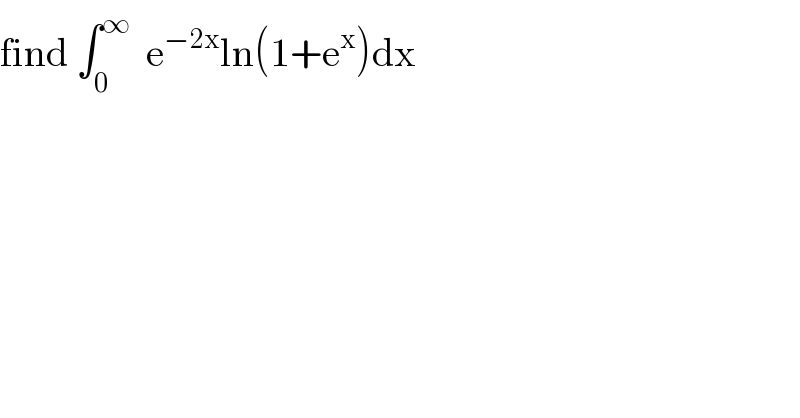
Question and Answers Forum
Question Number 123674 by mathmax by abdo last updated on 27/Nov/20

Answered by Dwaipayan Shikari last updated on 27/Nov/20
![∫_0 ^∞ e^(−2x) log(1+e^x )dx =∫_1 ^∞ ((log(1+t))/t^3 ) dt e^x =t =[((log(t+1))/(−2t^2 ))]_1 ^∞ +∫_1 ^∞ (1/(2t^2 (t+1)))dt =((log2)/2)+∫_1 ^∞ (1/(2t^2 ))−(1/(2t))+(1/(2(t+1)))dt =((log2)/2)+(1/2)+[(1/2)log(((t+1)/t))]_1 ^∞ =(1/2)](Q123684.png)
Answered by mathmax by abdo last updated on 28/Nov/20
![I =∫_0 ^∞ e^(−2x) ln(1+e^x )dx changement e^x =t give I =∫_1 ^∞ t^(−2) ln(1+t)(dt/t) =∫_1 ^∞ t^(−3) ln(1+t)dt =_(by parts) [−(1/2)t^(−2) ln(1+t)]_1 ^∞ +(1/2)∫_1 ^∞ t^(−2) (1/(1+t))dt =((ln(2))/2) +(1/2)∫_1 ^∞ (dt/(t^2 (t+1))) let decompose F(t)=(1/(t^2 (t+1))) F(t)=(a/t)+(b/t^2 ) +(c/(t+1)) b=1 , c=1 ⇒F(t) =(a/t)+(1/t^2 ) +(1/(t+1)) lim_(t→+∞) tF(t)=0 =a+c ⇒a=−1 ⇒F(t)=−(1/t)+(1/t^2 )+(1/(t+1)) ⇒∫_1 ^∞ F(t)dt =∫_1 ^∞ ((1/(t+1))−(1/t))dt +[−(1/t)]_1 ^∞ =[ln∣((t+1)/t)∣]_1 ^∞ +1 =−ln2 +1 ⇒ I =((ln(2))/2)−((ln(2))/2)+(1/2) ⇒ I =(1/2)](Q123760.png)
| ||
Question and Answers Forum | ||
Question Number 123674 by mathmax by abdo last updated on 27/Nov/20 | ||
 | ||
Answered by Dwaipayan Shikari last updated on 27/Nov/20 | ||
![∫_0 ^∞ e^(−2x) log(1+e^x )dx =∫_1 ^∞ ((log(1+t))/t^3 ) dt e^x =t =[((log(t+1))/(−2t^2 ))]_1 ^∞ +∫_1 ^∞ (1/(2t^2 (t+1)))dt =((log2)/2)+∫_1 ^∞ (1/(2t^2 ))−(1/(2t))+(1/(2(t+1)))dt =((log2)/2)+(1/2)+[(1/2)log(((t+1)/t))]_1 ^∞ =(1/2)](Q123684.png) | ||
| ||
Answered by mathmax by abdo last updated on 28/Nov/20 | ||
![I =∫_0 ^∞ e^(−2x) ln(1+e^x )dx changement e^x =t give I =∫_1 ^∞ t^(−2) ln(1+t)(dt/t) =∫_1 ^∞ t^(−3) ln(1+t)dt =_(by parts) [−(1/2)t^(−2) ln(1+t)]_1 ^∞ +(1/2)∫_1 ^∞ t^(−2) (1/(1+t))dt =((ln(2))/2) +(1/2)∫_1 ^∞ (dt/(t^2 (t+1))) let decompose F(t)=(1/(t^2 (t+1))) F(t)=(a/t)+(b/t^2 ) +(c/(t+1)) b=1 , c=1 ⇒F(t) =(a/t)+(1/t^2 ) +(1/(t+1)) lim_(t→+∞) tF(t)=0 =a+c ⇒a=−1 ⇒F(t)=−(1/t)+(1/t^2 )+(1/(t+1)) ⇒∫_1 ^∞ F(t)dt =∫_1 ^∞ ((1/(t+1))−(1/t))dt +[−(1/t)]_1 ^∞ =[ln∣((t+1)/t)∣]_1 ^∞ +1 =−ln2 +1 ⇒ I =((ln(2))/2)−((ln(2))/2)+(1/2) ⇒ I =(1/2)](Q123760.png) | ||
| ||